
by Ecoziva (Brazil) | Jun 17, 2013 | Babies, Being Thankful, Birthing, Brazil, Family, Health, Home, Humanity, Husband, Inspirational, Motherhood, Pregnancy, Spirituality, Womanhood, World Motherhood, Writing, Younger Children
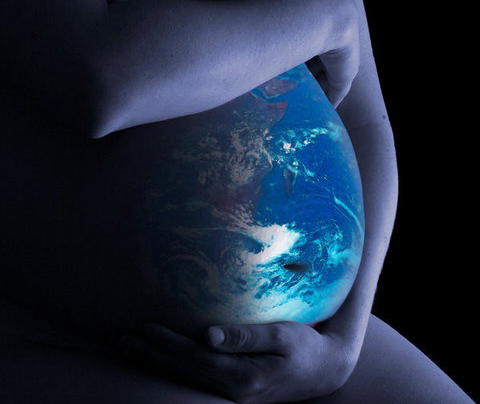
Coincidence or not, about five minutes after the encouraging message the contractions began. At first I didn’t want to admit they were contractions – not even to myself. It is true that they were different from any kind of contraction I had felt before. They were restricted to a small area of my lower abdomen and were less painful. By then my husband had already filled in the tub and after a while I finally accepted I was in active labor and agreed that he turn on the water heater.
The warm water calmed me and I managed to get all thoughts out of my mind. The fear was completely gone. I soon figured out that each contraction lasted exactly the time it took for me to mentally recite four prayers I knew by heart due to my Catholic upbringing: Our Father, the Hail Mary, the Guardian Angel and the Saint Germain prayers. I used that as a meditation and it made the contractions quite bearable.
What was happening around me is all jumbled in my mind and I don’t really remember. I know that our daughter had become fully awake, while our son completely blacked out no matter how much his father tried to wake him. My husband was also running around back and forth organizing things (I think).
The midwife arrived at around 11:30 p.m. with her daughter (an apprentice midwife), a doula, and her sister, an acupuncturist. After talking with them for a while I reluctantly left the water to be examined. The baby’s heartbeat was fine and I was 7 cm dilated.
Since my daughter’s labor had progressed a bit faster I was slightly discouraged thinking I still had another hour or so before reaching full dilation. However, at this point the midwife asked permission to try something new with me. She (who is also an acupuncturist) and her sister had recently learned a way to diminish the pain in labor and I would be the first they would try it on. They also wanted to try a technique where I would push as little as possible and let the baby come out softly in order to avoid tearing (this was due to my big babies and the enormous tear I had the previous time).
No, the pain did not diminish (much to the contrary!). Yet what happened after she placed the acupuncture needles was equally amazing. Things sped up considerably and in two or three contractions I felt like pushing. Not only did I feel like pushing but I couldn’t help it – so much for letting the baby come out slowly! Differently from my previous labor processes, where the pushing phase felt much more like a need to go to the bathroom, this time these contractions were quite painful.
During my daughter’s labor process I held back for a while during the pushing phase because I was afraid of tearing. This time I just wanted to get it over with and see our son. Not simply get over with labor – I wanted to put it all behind me, all the months of illness after illness, all the fear, and now the pain.
At some point our daughter (who was watching everything outside the tub, right behind me) started crying, I guess from all the faces I was making as I pushed. I reassured her mommy was fine and my husband picked her up.
I pushed so hard I began to feel my blood pressure drop as if I was going to faint. I asked for the water-honey mixture my husband had prepared while the midwife pressed an acupressure point straight below my nose, and I soon felt better.
I checked to see how far the baby was from crowning and was once again discouraged when I felt the head about 10 cm away. The midwife reassured me that it wouldn’t take long for him to descend and in the next contraction I pushed with all my might. I checked again and the seemed the distance seemed to have decreased by half.
Amidst all this, everyone in the room was singing a beautiful song that talked of world peace, union and love. What a wonderful way to welcome a new being onto this planet! Over the next days this song was in my head, and every time a warm feeling came to my heart, along with a wish that more children could come into the world in such a loving, harmonious way. I truly believe it would contribute to a more peaceful Earth.
Two or three contractions later he emerged. It was 34 minutes past midnight. I remember the first words the midwife told me, smiling, were “You broke a record!”
I asked if the cord was around his neck and she said yes and removed it. Then he came straight to my breast. I had felt a great sense of relief and contentment after my two other children were born – even after the C-section, but nothing can be compared to this time. All of a sudden I felt like a completely new woman, fearless and full of energy, and who seemed to never have been ill or in pain.
After the cord stopped pulsating, my husband cut it and we waited for the placenta, chatting excitedly. I had thought of having a Lotus birth, but after so much havoc I realized now I just wanted to rest. I donated the placenta to the midwife as she uses it to make homeopathic medicine.
All in all – despite the initial fear and panic – it was a wonderful birth, a great gift after such a difficult pregnancy. As I finish writing this our beautiful baby boy (the best gift of this entire story!) is sleeping peacefully next to me.
How was/were your birthing experience(s)? Please share.
This is an original post to World Moms Blog from our mother of three in Brazil, Eco Ziva.
Eco, from the greek oikos means home; Ziva has many meanings and roots, including Hebrew (brilliance, light), Slovenian (goddess of life) and Sanskrit (blessing). In Brazil, where EcoZiva has lived for most of her life, giving birth is often termed “giving the light”; thus, she thought, a mother is “home to light” during the nine months of pregnancy, and so the penname EcoZiva came to be for World Moms Blog.
Born in the USA in a multi-ethnic extended family, EcoZiva is married and the mother of two boys (aged 12 and three) and a five-year-old girl and a three yearboy. She is trained as a biologist and presently an university researcher/professor, but also a volunteer at the local environmental movement.
More Posts
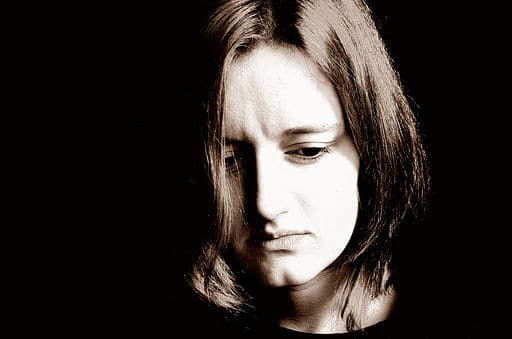
by Carol (Canada) | Jun 7, 2013 | Babies, Canada, Communication, Culture, Family, Health, Infertility, Kids, Loss of Child, Maternal Health, Miscarriage, Motherhood, Pregnancy, Relationships, Womanhood, Working Mother, World Motherhood, Younger Children

Recently, when I was around 10 weeks pregnant, I went in for a dating ultrasound.
My midwife wanted to confirm my baby’s due date, because we suspected that I was actually 9 weeks along, or maybe 11 weeks.
The radiologist discovered that my baby was dead – had died at 8 weeks and 4 days… whenever that had been.
We all know that miscarriage is always a risk, but it’s still a shock to go in for a routine ultrasound with a seemingly healthy pregnancy… and then leave in tears talking about getting a D&C.
A week later I was sedated and the remains of my baby were scooped out of me.
I was heartbroken. I was grieving.
But I was also very lucky: I had immense amounts of support.
I had friends texting me constantly asking what they could do to help. My house smelled like roses, because the girls at work sent me a big bouquet of flowers. My neighbours invited our son over for dinner so we wouldn’t have to fake cheerfulness with him, and left cookies in our mailbox.
The love and support I received contrasted violently with the experience of a friend, who was fired from work after her miscarriage, who got no flowers, no cookies, and whose grandmother and mother-in-law both hurt her frequently by nagging her to produce a baby.
But it’s not a fair comparison – you see, I told people about my miscarriage.
My friend did not.
The conventional wisdom – in our part of the world at least – says that you shouldn’t even tell people that you are pregnant, lest you miscarry. Better to wait until the second trimester, when your risk of miscarriage drops dramatically.
The implied assumption is that you don’t want to tell people about your miscarriage, so it’s better keep your pregnancy a secret until that danger has passed.
I want to know: Why don’t we want to talk about miscarriage?
For many women, miscarriage isn’t just a matter of, “Oops, never mind, no baby after all!” While some may feel that way, and that’s fine, others can be devastated.
I wasn’t just mourning the 8 week jellybean inside me. I was weeping for the baby I had been expecting, my Christmas baby, and as I wept, I clutched the little newborn sized Christmas pajamas that I had already bought.
And sometimes these women suffer side by side.
I had two friends who miscarried close to each other. Both told me, neither told the other. They each thought they were alone. Neither knew what the other was going through. Neither knew that they had something in common.
When I announced my loss at work, every woman over 35 had a miscarriage story to share.
Just think – of the ten women at my work, four have had miscarriages. And none of them talked about it… until I announced mine.
They shared their grief with me, and we hugged each other, and listened to each other’s stories.
And I wondered… why aren’t we supposed to do this?
Why do so many women keep miscarriage a secret, often not even telling friends or family members? Why do some women keep their pregnancies a dark secret, just out of fear that the pregnancy might end?
There’s an element of shame that hovers around miscarriage.
People think that talking about their miscarriage somehow addresses a failure, as if they had made a mistake.
It’s natural to blame yourself for your miscarriage. My first thought was, “What did I do wrong?”
The first thing my midwife said to me was, “You did nothing wrong.”
When I spoke to the nurse at the Early Pregnancy Assessment Centre, she told me that 97% of the time, miscarriages are caused by chromosomal abnormalities and have nothing to do with the mother’s actions.
When I went on to worry that something I was exposed to at work might have killed my baby – x-rays, or pesticides – she told me, “We see a LOT of women in here who are pregnant, but don’t want to be. You wouldn’t believe the crazy stuff they have tried to end the pregnancy at home. It never works. Trust me – there is nothing you could have done to bring this on yourself.”
My miscarriage was not my fault.
I didn’t fail, and the women who have told me about their miscarriages didn’t fail either. So why do we treat it like a failure?
But even the term “miscarriage” implies some fault on the woman, as if I had dropped the baby in a moment of thoughtlessness. In fact, some women have even been prosecuted for their miscarriages.
So we don’t tell people about it.
In a culture where you aren’t supposed to talk about your miscarriage – or even your first trimester pregnancy lest it end in miscarriage – families grieve for their lost babies in a vacuum of shame and secrecy.
There is no funeral. No compassionate leave. No Hallmark cards. But that doesn’t make it less real of a loss.
Even women who aren’t grieving their miscarriage – perhaps they didn’t even want the baby – feel the need to hide it due to the stigma around it.
And that’s never going to change unless people start talking.
Until we bring miscarriage into the light, it will remain a dark, hidden secret.
Until people start talking about it, people won’t know how to respond to it appropriately. Until we remove the stigma, the shame will continue.
Until we talk about it, people will continue to suffer in silence.
Because if you don’t tell anyone unless they have had a miscarriage too, how does anyone who has miscarried find each other?
It just takes one person to speak out, to announce their loss like it is any other loss, and the stories and support come pouring in.
So we need to speak up.
We need to tell people when we suffer a loss. We owe them that, and we owe ourselves that, because for all we know, they need someone to talk to, too. Don’t assume that they don’t know what you’re going through, because chances are, they do.
I’m asking all of you to be brave.
Talk about it on Facebook.
Tweet it, #talkaboutmiscarriage.
Tell people you don’t know very well.
Tell them if you’re grieving. Tell them if you aren’t.
There’s no reason to hide what has happened, or how you feel about it. Chances are neither the experience, nor your emotions, are unique to you.
Only by opening those doors can we find the support we need, and join together the women who have been suffering in silence for all this time.
Have you or has someone close to you had a miscarriage? How did cultural attitudes toward it affect the grieving process?
This is an original post for World Moms Blog by Carol. She can be found blogging at If By Yes and on Twitter @IfByYesTweets.
Photo credit to Jiri Hordan. This photo has been released into the public domain by its author, Jiri Hordan.
Carol from If By Yes has lived in four different Canadian provinces as well as the Caribbean. Now she lives in Vancouver, working a full time job at a vet clinic, training dogs on the side, and raising her son and daughter to be good citizens of the world.
Carol is known for wearing inside-out underwear, microwaving yoghurt, killing house plants, over-thinking the mundane, and pointing out grammatical errors in "Twilight". When not trying to wrestle her son down for a nap, Carol loves to read and write.
Carol can also be found on her blog, If By Yes, and on Twitter @IfByYesTweets
More Posts - Website
Follow Me:


by Karyn Wills | Jun 3, 2013 | Babies, Being Thankful, Health, Kids, Life Balance, Maternal Health, Motherhood, New Zealand, Nutrition, Parent Care, Pregnancy, World Motherhood, Younger Children
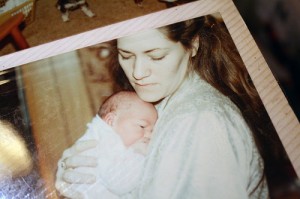 I had my third baby when I was 41. Many people told me I was bonkers and a few refused to congratulate me, but those who knew how it felt to long for a baby, whether that baby was number one or number six, were as delighted as I was.
I had my third baby when I was 41. Many people told me I was bonkers and a few refused to congratulate me, but those who knew how it felt to long for a baby, whether that baby was number one or number six, were as delighted as I was.
I was unfit, I knew that once the baby came I would feel tired, and I knew that I would have no time to myself. We already had one son who felt secure with strong boundaries and a gazillion hugs a day, and another who felt truly secure only while he was attached to my body. I knew that I would have to take each day, each hour, perhaps each minute as it came.
This was my self-imposed Everest: to give completely of myself until all the boys chose to pull away from me or manage my small nudges out of the nest, in order that they properly develop their wings. I figured things would begin to get somewhat easier at around the 18 month to two year mark. A friend, who had also had a third baby in her 40s, said it would take four years. I didn’t believe her.
I hadn’t counted on a 24 hour labour followed by a massive bleed on the operating table during an emergency C-Section. I hadn’t planned on premenopausal bodily hiccups. I never imagined I’d feel like I was churning through porridge day after day, after day, after day. But that’s what I got.
Just before Christmas last year I could stand it no longer. I was barely functioning, and I truly felt like this level of energy was my lot. I had three energetic and wonderful boys who needed a Mum with some oomph and pizzazz. I did a breathing rate test off the internet, and my results were worse than a heavy smoker and the same as someone in heart-failure. I went to the doctor.
It was then that I discovered that my iron and haemoglobin levels were extremely low – I joke that I was three quarters dead. Thankfully, my vitamin B levels were fine, my thyroid was doing its happy dance, and I passed the depression test. I got my iron levels sorted and began to feel a bit better.
Still, I wasn’t feeling great and I did wonder, again, if this amount of energy was my lot.
I tweaked my diet. I began rising earlier and going to bed at the same time as the boys. Our baby turned three and a half, and then three and three quarters.
And now, finally, after close to four years, I am almost back to myself. I cannot possibly regret having a gorgeous and much loved child in my 40s. I cannot possibly regret any of the time or energy I have put into any of my beautiful boys. But I can tell you this in complete confidence:
I am damned pleased to be on this side of the mountain!
How did life events affect how you coped with parenting your babies and toddlers?
This is an original post to World Moms Blog from our contributor in New Zealand, Karyn.
The image used in this post is credited to Lindsey Turner. It holds a Flickr Creative Commons attribution license.
Karyn is a teacher, writer and solo mother to three sons. She lives in the sunny wine region of Hawke’s Bay, New Zealand in the city of Napier.
More Posts

by Elizabeth Atalay | May 28, 2013 | 2013, Birthing, Clean Birth Kits, Contraception, Social Good, Social Media, Women's Rights, World Events, World Moms Blog, World Voice
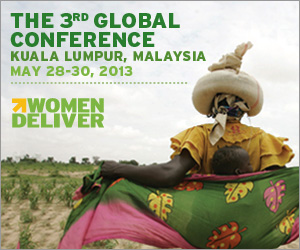
Beginning today in Kuala Lumpur the world gathers at the Women Deliver conference, the third global conference to be held focusing on the health and well-being of girls and women. Starting today and running through May 30th International leaders, policymakers, healthcare professionals, NGO’s, youth leaders, corporations, and media outlets recognize the value of girls and women and take on solutions to issues affecting girls and women around the world. It is becoming increasingly clear that the most valuable investment we can make is in girls and women.
With the 2015 Millennium Development Goal deadline rapidly approaching, the time is now to deliver for girls and women, and Women Deliver 2013 will serve as a global platform for ensuring that the health and rights of girls and women remain top priorities now, and for decades to come.
Luckily we do not have to travel to Malaysia to participate; You can watch the conference livestream or go back to find the sessions that have been recorded that you may have missed. You can chime in or follow using the hashtag #WD2013 on twitter, and get the days re-cap by looking through #WDLive.

The +Social Good community also launched in Kuala Lumpur this week, and was inspired by the Social Good Summit, as a community of innovators, connectors and global citizens come together with the shared vision to make the world a better place. There are many ways to join in on the global conversation this week around women, girls and social good, we’ll see you there!

Elizabeth Atalay is a Digital Media Producer, Managing Editor at World Moms Network, and a Social Media Manager. She was a 2015 United Nations Foundation Social Good Fellow, and traveled to Ethiopia as an International Reporting Project New Media Fellow to report on newborn health in 2014. On her personal blog, Documama.org, she uses digital media as a new medium for her background as a documentarian. After having worked on Feature Films and Television series for FOX, NBC, MGM, Columbia Pictures, Warner Brothers, 20th Century Fox, and Castle Rock Pictures, she studied documentary filmmaking and anthropology earning a Masters degree in Media Studies from The New School in New York. Since becoming a Digital Media Producer she has worked on social media campaigns for non-profits such as Save The Children, WaterAid, ONE.org, UNICEF, United Nations Foundation, Edesia, World Pulse, American Heart Association, and The Gates Foundation. Her writing has also been featured on ONE.org, Johnson & Johnson’s BabyCenter.com, EnoughProject.org, GaviAlliance.org, and Worldmomsnetwork.com. Elizabeth has traveled to 70 countries around the world, most recently to Haiti with Artisan Business Network to visit artisans in partnership with Macy’s Heart of Haiti line, which provides sustainable income to Haitian artisans. Elizabeth lives in New England with her husband and four children.
More Posts

by World Moms Blog | Apr 19, 2013 | Africa, Clean Birth Kits, Economy, Education, Family, Health, Human Rights, International, Motherhood, Multicultural, Older Children, ONE, Parenting, Poverty, Pregnancy, Shot@Life, Sleep, Sleep and Children, Social Good, Travel, Uganda, United Nations, Vaccines, Womanhood, World Moms Blog, World Motherhood, World Voice, Younger Children
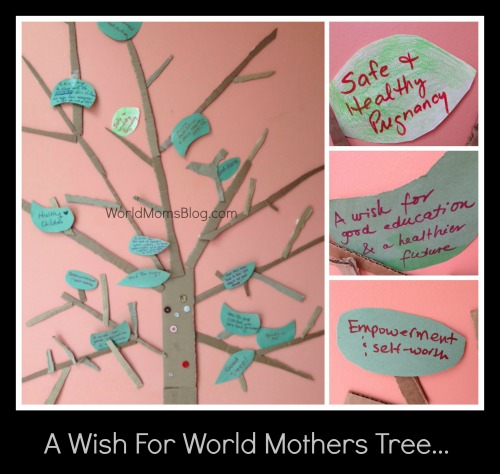 The World Moms are making a difference in the world, and we get excited to see our friends and readers run with something we’ve advocated for. Today we are featuring a guest post from a friend of the blog, Shilpa, owner of the online global home and fashion retailer, Harabu House.
The World Moms are making a difference in the world, and we get excited to see our friends and readers run with something we’ve advocated for. Today we are featuring a guest post from a friend of the blog, Shilpa, owner of the online global home and fashion retailer, Harabu House.
“Equal pay for women”, “Healthy Children”, “A Good Sleep”, “A Good Education”, “Safe and Healthy Pregnancies” are just some of the wishes expressed for world moms at a casual event hosted by Jennifer Burden, founder of World Moms Blog. Jennifer had organized this event to highlight her trip to Uganda with the UN Foundation’s Shot@Life program, while telling a group of about 30 women about the women behind World Moms Blog and their social good initiatives.
A mutual friend of ours had suggested that Jen and I would hit it off with our interest in all things global, and we sure did! I was thrilled when I received an invitation to her event as I wanted to know more about her trip to Uganda.
We enjoyed wine, cheese and chocolate at Jen’s house and shared our own wishes for world mothers on a tree created from cardboard on her wall. Then, she called us into her family room in the middle of the party for a presentation. With her laptop connected to her T.V., she took us on a journey to Uganda through pictures. (more…)
World Moms Blog is an award winning website which writes from over 30 countries on the topics of motherhood, culture, human rights and social good. Over 70 international contributors share their stories from around the globe, bonded by the common thread of motherhood and wanting a better world for their children.
World Moms Blog was listed by Forbes Woman as one of the "Best 100 Websites for Women 2012 & 2013" and also called a "must read" by the NY Times Motherlode in 2013. Our Senior Editor in India, Purnima Ramakrishnan, was awarded the BlogHer International Activist Award in 2013.
More Posts

by Ecoziva (Brazil) | Apr 4, 2013 | Birthing, Brazil, Motherhood, Pregnancy, World Moms Blog, World Motherhood
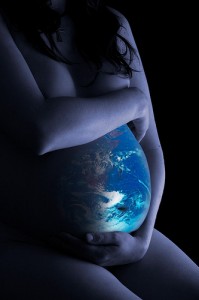 Today’s post is a continuation of a South American birth story from our contributor in Brazil, Eco Ziva. Click here for first part of her story on World Moms Blog.
Today’s post is a continuation of a South American birth story from our contributor in Brazil, Eco Ziva. Click here for first part of her story on World Moms Blog.
When our son brought my husband in I said I wasn’t going to get up and asked him to put some towels underneath me. I was determined to stay as still as possible in the fear-filled hope that the intense labor contractions wouldn’t begin. I continued breastfeeding our daughter in the exact same position. Even though nothing else happened besides what seemed like endless gushes of water, I felt more and more scared.
I wanted my husband to talk to the midwife and to the doctor because I didn’t feel like communicating with anyone. Nothing else mattered except staying still. I told my fear-altered self that if I stood still enough I wouldn’t actually go into labor and would simply be whisked off to the hospital for a simple and painless C-section.
Way deep inside me, a weak little voice tried to tell me things like “Remember what you prepared yourself for”, “You give birth so fast, your baby will be born in the car if you go to the hospital”, “You don’t want to get that awful epidural for no reason”, and so on. (more…)
Eco, from the greek oikos means home; Ziva has many meanings and roots, including Hebrew (brilliance, light), Slovenian (goddess of life) and Sanskrit (blessing). In Brazil, where EcoZiva has lived for most of her life, giving birth is often termed “giving the light”; thus, she thought, a mother is “home to light” during the nine months of pregnancy, and so the penname EcoZiva came to be for World Moms Blog.
Born in the USA in a multi-ethnic extended family, EcoZiva is married and the mother of two boys (aged 12 and three) and a five-year-old girl and a three yearboy. She is trained as a biologist and presently an university researcher/professor, but also a volunteer at the local environmental movement.
More Posts












 The World Moms are making a difference in the world, and we get excited to see our friends and readers run with something we’ve advocated for. Today we are featuring a guest post from a friend of the blog, Shilpa, owner of the online global home and fashion retailer,
The World Moms are making a difference in the world, and we get excited to see our friends and readers run with something we’ve advocated for. Today we are featuring a guest post from a friend of the blog, Shilpa, owner of the online global home and fashion retailer, 
 Today’s post is a continuation of a South American birth story from our contributor in Brazil,
Today’s post is a continuation of a South American birth story from our contributor in Brazil,


